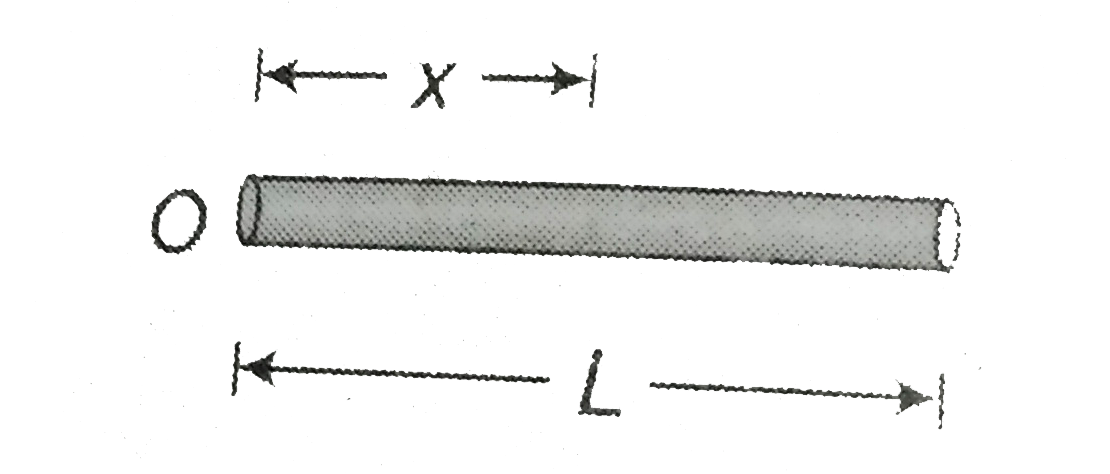The density of a non-uniform rod of length 1m is given by ρ(x)=a(1+bx2)
where a and b are constants and 0≤x≤1.
The centre of mass of the rod will be at
3(2+b)4(3+b)
4(2+b)3(3+b)
3(3+b)3(2+b)
4(3+b)3(2+b)
The correct Answer is:A
When b→0. The density becomes uniform and hence the centre of mass is at x=0.5. Only option (A) tends to 0.5 as b→0
Topper's Solved these Questions
- DAILY PRACTICE PROBLEMBOOK - RESONANCECHAPTER - DAILY PRACTICE PROBLEMEXERCISE - DPP No.65
9 Videos
- DAILY PRACTICE PROBLEMBOOK - RESONANCECHAPTER - DAILY PRACTICE PROBLEMEXERCISE - DPP No.66
20 Videos
- DAILY PRACTICE PROBLEMBOOK - RESONANCECHAPTER - DAILY PRACTICE PROBLEMEXERCISE - DPP No.63
9 Videos
- CURRENT ELECTRICITYBOOK - RESONANCECHAPTER - CURRENT ELECTRICITYEXERCISE - High Level Problems (HIP)
21 Videos
- ELECTRO MAGNETIC WAVESBOOK - RESONANCECHAPTER - ELECTRO MAGNETIC WAVESEXERCISE - Exercise 3
27 Videos
Similar Questions
The linear mass density i.e. mass per unit length of a rod of length L is given by ρ=ρ0(1+xL), where ρ0 is constant , x distance from the left end. Find the total mass of rod and locate c.m. from the left end.

View SolutionThe mass per unit length of a non- uniform rod OP of length L varies as m=k(x)/(L) where k is a constant and x is the distance of any point on the rod from end 0 .The distance of the centre of mass of the rod from end 0 is
View Solution
Knowledge Check
The density of a non-uniform rod of length 1 m is given by ρ(x)=a(1+bx2) where a and b are constant and 0≤x≤1.
The centre of mass of the rod will beA3(2+b)4(3+b)B4(2+b)3(3+b)C3(3+b)4(2+b)D4(3+b)3(2+b)The density of a non-uniform rod of length 1m is given by ρ(x)=a(1+bx2) where, a and b are constant and 0≤x≤1. The centre of mass of the rod will be at
A3(2+b)4(3b+b)B4(2+b)3(3+b)C3(3+b)4(2+b)D4(3+b)3(2b+b)The linear density of a non−uniform rod of length 2m is given by λ(x)=a(1+bx2) where a and b are constants and 0≤x≤2. The centre of mass of the rod will be at. X=
A3+6b6+8bB6+2b3+4bC3+6b3+4bD1+2b3+4b
The linear density of a thin rod of length 1m lies as λ=(1+2x), where x is the distance from its one end. Find the distance of its center of mass from this end.
View SolutionA rod of mass m and length L is non- uniform.The mass of rod per unit length (mu)], varies as "(mu)=bx" ,where b is a constant.The , centre of mass of the ,rod is given by
View SolutionThe mass per unit length of a non - uniform rod of length L is given μ=λx2 , where λ is a constant and x is distance from one end of the rod. The distance of the center of mas of rod from this end is
View SolutionThe mass per unit length of a non-uniform rod of length L is given by μ=λ×2, where λ is a constant and x is distance from one end of the rod. The distance of the center of mass of rod from this end is :-
View SolutionThe centre of mass of a non uniform rod of length L, whose mass per unit length varies as ρ=k.x2L where k is a constant and x is the distance of any point from one end is (from the same end)
View Solution
